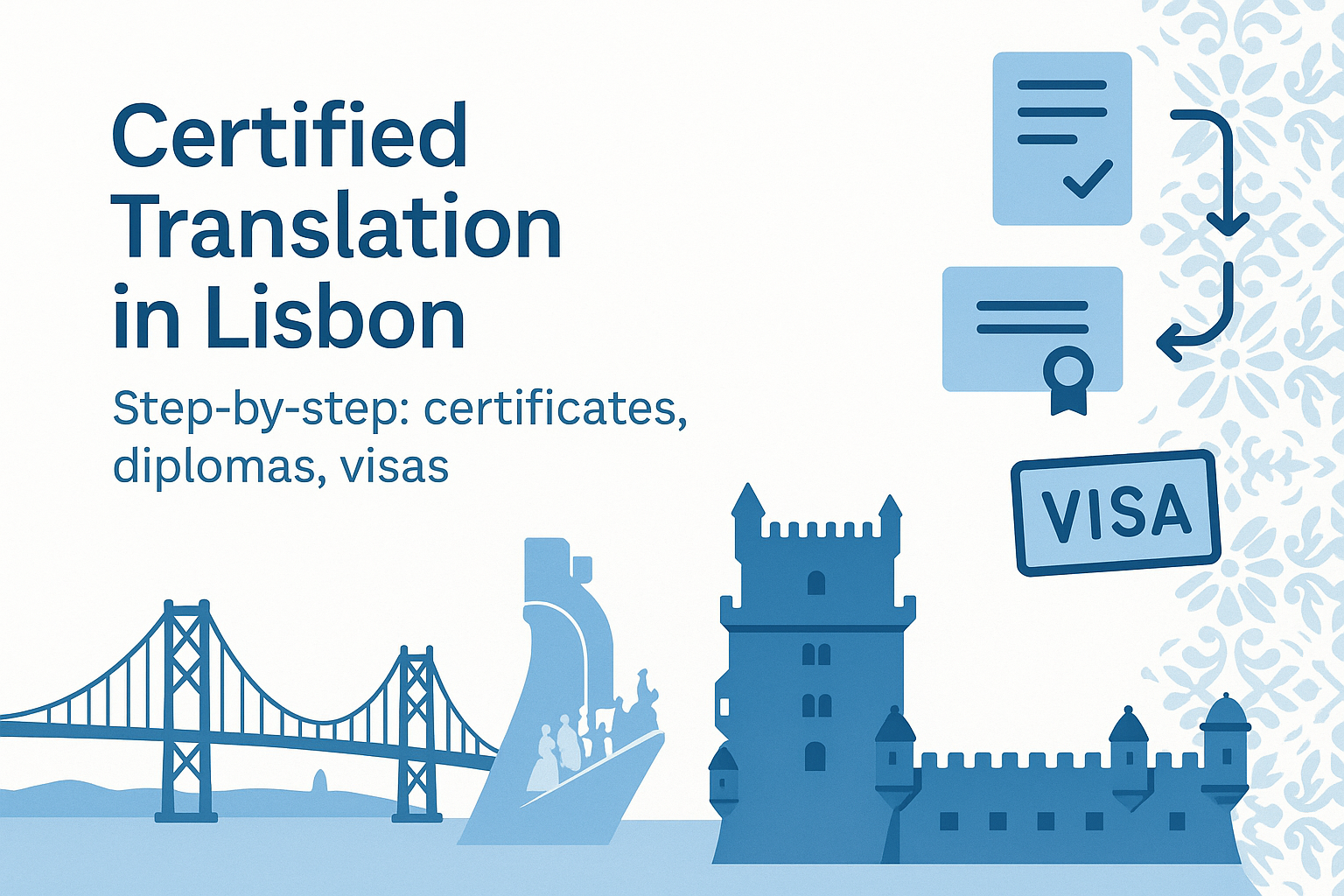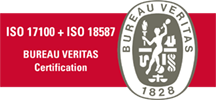Certified translation in Lisbon — step-by-step for certificates, diplomas and visas
A certified translation in Lisbon is straightforward when you know the path. Below you’ll find a practical, legal-proof workflow for certificates, diplomas and visas.

Table of Contents
Certified translation in Lisbon: the step-by-step workflow
If your document must be valid before public authorities or universities, you’ll typically need a certified translation. In Portugal, certification is performed before a notary/solicitor or lawyer; when the document is to be used abroad, add the Hague Apostille as required by the destination. Start by confirming the destination country and acceptance rules; this prevents rework and shipping delays.
- Collect originals (or clear scans).
- Share destination and purpose so we can apply the right formalities.
- We translate, revise and prepare the certification bundle.
- If needed abroad, we handle Apostille sequencing so the translation leaves Lisbon ready for use.
Behind the scenes, quality relies on process: our Translation Services follow ISO-aligned methods, with rigorous review under our “Zero Errors, Total Satisfaction” commitment and continuous skills upgrades via Ongoing Training.
Where to get a certified translation in Lisbon
For a fast, compliant certified translation in Lisbon, choose a team that covers legalisation end-to-end. We combine specialised linguists with legal workflows and can advise whether you also need the Apostille. If your case involves contracts, court decisions or notarial deeds, our Legal Translation team ensures terminology accuracy. Engineering, medical or financial attachments? Route them via Technical Translation for field-specific rigour. For volume or multi-language roll-outs, see how We translate the world across 60+ languages, backed by our Continuous Improvement program.
Birth, marriage and other civil certificates
Civil registry extracts (birth, marriage, death, criminal record, company register, driving licence, etc.) are the most frequent certified translations requested in Lisbon. Authorities often specify an extract type, issue date, and whether they accept multilingual forms.
Good practice:
- Ask your registry office for the latest extract format (some accept multilingual models that reduce translation needs).
- Keep names and dates consistent with passports.
- Provide any prior translations for alignment.
When the receiving entity is in Portugal, a certified translation usually suffices. For use abroad, the Hague Apostille may be required on the certified translation or on the original (jurisdictions differ). We will confirm the correct order and assemble the file accordingly so it’s accepted on first submission.
Diplomas, transcripts and academic records
Universities and professional bodies want clarity, equivalence and traceability. Include the diploma, transcript, course list, ECTS/credit tables and, when available, program descriptions or syllabi. We recommend:
- Consistency of degree names: keep official titles and add recognised translations.
- Legibility: provide colour scans with seals and signatures visible.
- File structure: one PDF per credential group reduces back-and-forth.
Academic dossiers often go to evaluators or NARIC-type centres abroad. We prepare the certification text to reference document IDs, page counts and language pairs precisely. When admissions offices request speed, we stage delivery: electronic preview for verification, then the signed and stamped certified set couriered as required.
Visas, immigration and residence
Immigration processes (residence permits, family reunification, work visas, asylum, etc.) may require certified translations of civil status, employment, income and criminal record documents. In Portugal, authorities indicate when translation is mandatory and when it may be waived (e.g., certain languages in specific procedures). We align our certification to the instructions you receive and sequence Apostille/legalisation when your documents cross borders.
Prepare a clear pack: passport, application forms, supporting evidence (contracts, bank statements), civil certificates, and any prior permits. Label files by type and date. For multi-country cases (e.g., using a Portuguese document in a non-EU jurisdiction), tell us the final destination so we can attach the proper legalisation path and return a bundle that’s ready to file.
Timing, costs and how to avoid rework
Timelines. Small civil certificates can be turned quickly; multi-document academic or visa files may need additional days for notarisation and Apostille queues. Tell us your deadline and any booking dates so we can prioritise steps that impact appointments.
Costs. Pricing depends on word count, language pair, and legalisation steps. Technical content or multi-currency deliveries (CTT/DHL) may add fees. We’ll provide a clear quote and options (e.g., staged delivery or grouped Apostille) to control spend.
Zero rework tips.
- Share the destination country and authority (consulate, university, court).
- Provide originals or certified copies with visible seals.
- Confirm whether Apostille is needed and on which component.
- Keep names consistent with travel documents to avoid mismatches.
If your pack includes contracts or technical annexes, combine our certified route with domain specialists via Legal Translation and Technical Translation to ensure formality and domain accuracy in one go.
FAQ
Q1. Do I always need the Hague Apostille with a certified translation in Lisbon?
Not always. The Apostille is a separate formality that confirms the authenticity of a public document for use in another Hague-Convention country. Whether you need it depends on the destination and the authority receiving your file. Many Portuguese documents used within Portugal require only a certified translation. When documents are destined for abroad, some jurisdictions ask the Apostille to be placed on the original, others on the certified translation, and some on both.
We’ll check the receiving authority’s instruction and propose the correct order so your documents are accepted without further legalisation. If you’re unsure, tell us the destination country and the exact office (e.g., consulate, university admissions, court clerk). We’ll align the notarisation and Apostille steps to that requirement.
Q2. Which documents typically require a certified translation for visas and residence?
Common items include civil registry extracts (birth, marriage, death), criminal record certificates, employment contracts, pay slips, bank statements, tenancy agreements and academic credentials. Immigration authorities also ask for letters from employers or schools and may require translations of supporting evidence such as tax returns or shareholder certificates.
Because visa programs change and have document-specific rules, the safest approach is to use the checklist provided by the authority handling your application and cross-reference it with our file-preparation guidance. Share your deadline and appointment dates so we can schedule translation, certification and, if needed, Apostille in the right sequence.
Q3. How do universities abroad assess translated diplomas and transcripts?
Evaluators look for completeness, consistency and traceability. They expect the degree title, issuing institution, dates, stamp/seal visibility and a clear mapping of grades to the destination system. Our certified translations include a declaration of accuracy that references the source document set and page count.
To avoid delays, supply any official grade-conversion tables, course descriptions and prior equivalence reports. If the destination country requires Apostille on the diploma or on the certified translation, we’ll guide the order so that the evaluator receives a fully compliant package.
Q4. Can I speed up a certified translation in Lisbon without quality loss?
Yes—by preparing clean scans, confirming the destination, grouping related documents, and sharing any previous translations or glossaries. We triage by deadline and can stage delivery (digital preview for verification, then notarised hard copies and courier). For large or technical packs, we allocate specialist linguists and apply our ISO-aligned QA, combining revision with domain checks.
If Apostille is needed, we’ll plan for external lead times. Tell us if you have fixed interview or enrollment dates; we’ll prioritise the translation and certification steps that unlock your appointment first, then complete remaining items.
Links
- Internal:
- External:

